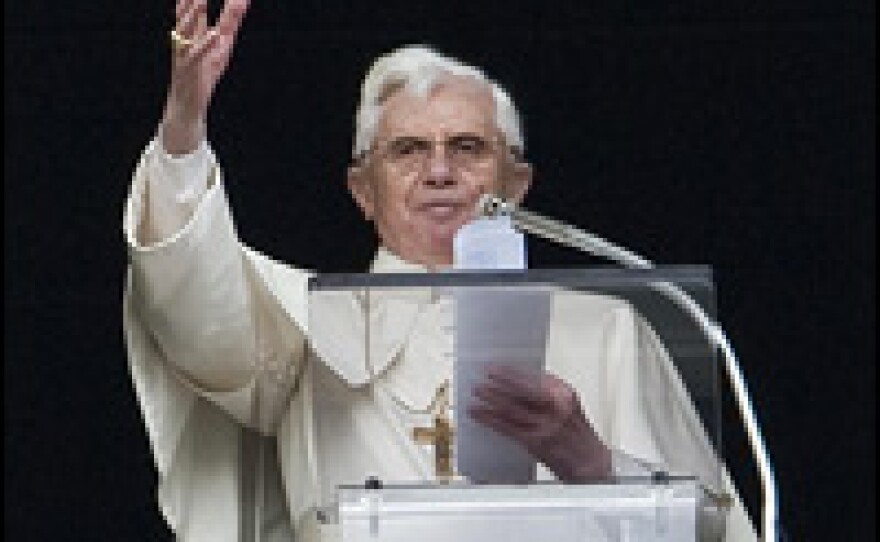A decision by Pope Benedict XVI to welcome four ultratraditionalist bishops back into the Roman Catholic Church — including a man who denies the Holocaust happened — has sparked a global outcry from Jews and unprecedented criticism from many Catholics.
The Vatican has said the pope was unaware that Bishop Richard Williamson is a Holocaust denier. Its YouTube channel has several clips of the pope condemning Holocaust denial and upholding good relations with Judaism.
And Pope Benedict will meet Thursday with the presidents of major American Jewish organizations.
"We are hoping to hear more from his holiness during the meeting, and I expect that we will," says Malcolm Hoenlein, the executive vice chairman of the Conference of Presidents of Major American Jewish Organizations.
Hoenlein says the Vatican must be very clear about the Holocaust and those who deny it.
"The message to the church is that you can't ignore it, you can't sweep it under the rug or put them in a corner and isolate them," he says. "It is like a cancer that once you give it any kind of legitimacy, then it can spread."
'In The Midst Of A Tempest'
At the center of the storm is the Society of St. Pius X, which opposes the reforms of the Second Vatican Council, including one that rejects the centuries-old accusation that Jews were responsible for Christ's death.
At the society's small chapel in Rome, a priest has his back to the faithful as he celebrates the traditional Latin Mass. In his sermon, Don Curzio makes no mention of the Vatican's demand that the group embrace the teachings of Vatican II.
"It's time to be silent," he says. "We're in the midst of a tempest. We must remain faithful to our credo ... and we'll be rewarded with paradise."
The society has begun to clean up its act: It fired Williamson, the Holocaust denier, from his seminary; it removed a virulently anti-Semitic tract from its Web site; and it banished an Italian Holocaust-denying priest.
But the Rev. Richard McBrien, a Notre Dame theology professor, doubts the society will suddenly embrace ideas it has always rejected.
"There are more Holocaust deniers in the ... movement than those two, and there's more anti-Semitism than those two," he says. "I think it's only skin-deep, this effort to sanitize their image."
Grass-Roots Uproar
The question for many Catholics is why Pope Benedict reached out to such an ultraconservative movement. There's turmoil at the grass-roots level. Vatican Radio and other Catholic outlets are inundated with e-mails from angry members of the flock, defending the Second Vatican Council's reforms.
Nowhere is the outrage more intense than in the pope's native Germany and in Austria, where Holocaust denial is a crime punishable with jail time. The magazine Der Spiegel reports a wave of Germans literally taking their names off Catholic Church rolls.
Even Christoph Schonborn, the archbishop of Vienna, who helped Joseph Ratzinger become Pope Benedict, said there is no place in the church for Holocaust deniers.
The Rev. Hans Maier, a theologian and former president of the German Catholic Association, was scathing in his comments in an interview with Vatican Radio.
"It's unforgivable bishops were not consulted," he said. "The Vatican needs a system of checks and balances, just like any government."
The Rev. Thomas Reese of Georgetown University says there is a fatal systemic flaw in the decision-making process in the Vatican. "You need people with different ideas, not just loyalists, not just people who are yes men, but people who will actually argue and give different perspectives on a problem when it arises."
Conservative columnist George Weigel says the Vatican can no longer act as if this were still the world of the 1815 Congress of Vienna.
"This is a 24-7 news environment," he says. "An institution which proclaims that the truth will make you free had better be in touch with the truth, no matter how unpleasant that truth may be."
Copyright 2022 NPR. To see more, visit https://www.npr.org. 9(MDAzMjM2NDYzMDEyMzc1Njk5NjAxNzY3OQ001))







